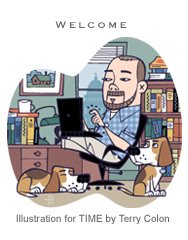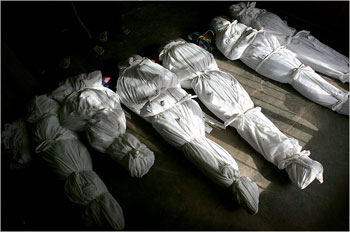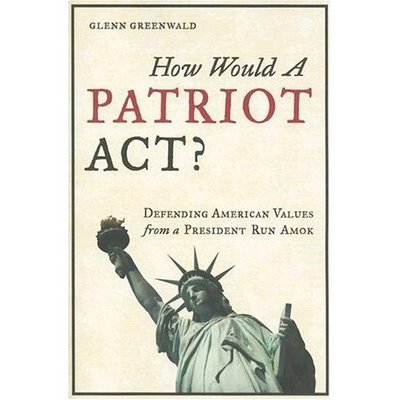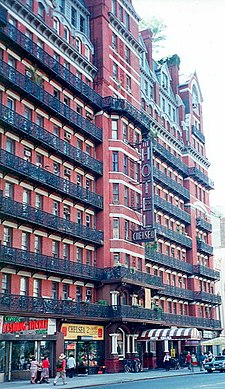Solitude and Hope: Y'all Come Visit!
Publick and Privat Curiosities: Articles Related to News, Politics, Society, Gay Issues, Psychology, Humor, Music and Videos.June 15, 2006
Hadji Girl: The Executioner's Song

Pete Blackwell, in a posting on Parenthetical Remarks, recently reported to his readers that:
[Andrew],Sullivan [wrote] about a disturbing video that has popped up on YouTube showing an American Marine "letting off steam" by singing a song about killing two little Iraqi girls to a group of cheering soldiers. One of Sullivan's readers, an American Muslim, responds by saying he understands "that this is gallows humor," but it doesn't reflect too well on our men in uniform (to put it mildly).
It's a magnanimous response, but he's got it wrong. It's not gallows humor when you're the executioner.
In an update today, Sullivan writes:
Several readers have said I misunderstod the lyrics of the song, for which the Marine has now apologized. Listening closely again, I think I did - thanks to a much better video recording of the performance....My mistake. But even [after hearing the better recording], this Marine's tale is of grabbing an innocent little girl as a human shield, and laughing maniacally as "blood sprayed between her eyes." And if you watch the video again, you'll see a broad smile flicker across the guy's face as he sings about the little girl's face being blown apart.
Windows To Our Souls: Daily Life in America

Views From Our Windows
Andrew Sullivan has observed that he gets to read some of the smartest emails on the web, “but you don't get to know who your fellow-readers are, where they live, what they do, what they see as they look out their window each morning.” Isn’t this also true for most of us on the web? Last year, a posting that I made here, The Dawn, conveyed a similar theme.
In response to this sense of internet opaqueness and anonymity, Sullivan began an on-line project called “The Window Project.” He asked his readers to get out their digital cameras and take pictures of the views from their windows, from the living room window, bathroom window, car-window or even from an office window. Here are a just few of the window views that have been posted on his blog. The first window picture is the most emotionally touching for me, evoking sad memories about and feelings for New Orleans. Many of the other window pictures can be seen on Sullivan’s website.











June 11, 2006
Bush: Addicted to Words

Addicted to Words
The BBC News published an interesting article today. The extract below describes the unsettling disconnect between what Bush says, versus what he actually manages to do:
As I listened to him I suddenly had my own revelation.
George Bush's principal problem is not that he can't articulate what's on his mind. It's that he sometimes says it all too well. (I can only remember one line from that world-class word schmoozer Bill Clinton and it was a disclaimer about Miss Lewinsky which the former president probably wished no one had remembered!)
President Bush leaves after delivering remarks on the Marriage Protection Act in the Eisenhower Executive Office Building
Bush: Man of Words, Not Much Action
But vintage Bush lines like "axis of evil", "our mission is to end tyranny in our world", "America is addicted to oil", and "We are in a conflict between good and evil and America will call evil by its name!" do stick in my mind.
They are pithy phrases written for a transformational president, who underpins his policies with his faith.
They are crafted by a brilliant team of speech-writers, inspired by the Bible and meticulously approved by the man who has to deliver them. And because they can be remembered they hold up all too well to scrutiny or derision.
The "axis of evil" has been turned by the Economist into the "axis of feeble".
If America calls evil by its name, what does it call Abu Ghraib or Haditha? If it is addicted to oil what is the addict-in-chief doing to give his voters the cold turkey of recovery?
If it is committed to ending tyranny, why is America making friends with Colonel Gaddafi or allowing Egypt to get away with oppression?
And if President Bush is committed to defending "marriage as the most important institution in the history of mankind", what is he doing to lower the divorce rate or, for that matter, to bring about a constitutional amendment?
In his second term, the Decider (as he recently referred to himself) looks as if he's addicted to words. Not the kind of thing you'd expect from a swashbuckling Texan!
Gay Marriage: U. S. Senate Spanks Bush

As expected, the Senate on Wednesday rejected a proposed Constitutional amendment to ban same-sex marriage, rebuffing both President Bush, the Republican Party, the religious right and the general social conservative movement. After two days of emotional argument, the U. S. Senate voted 49 to 48 to shut off debate on a call to bring the amendment to the floor. The total fell well short of the 60 votes needed to actually end debate, let alone the 67 votes required to approve a constitutional amendment. The decision effectively killed the issue in the Senate.
Democratic critics of the proposal said that President Bush had advanced it to rally conservative voters, substantials numbers of whom have been drifting away from supporing him. Many observers have contended that Bush's focus upon the gay marriage issue was an attempt to divert the public's attention away from the disasters associated with the war in Iraq, our rapidly rising level of national debt, criticisms of federal domestic spying programs and soaring energy bills. In addition, many have said that the proposal was tantamount to writing discrimination into the Constitution.
June 10, 2006
Saul Bellow: Collection Given to The University of Chicago
 The University of Chicago has acquired the remaining professional papers from the estate of one of the most celebrated modern novelists, the late Saul Bellow, who was also a University faculty member. The acquisition, which will be combined with the University's existing Bellow Archive, is in accordance with Bellow's own wishes and brings his professional papers to one location.
The University of Chicago has acquired the remaining professional papers from the estate of one of the most celebrated modern novelists, the late Saul Bellow, who was also a University faculty member. The acquisition, which will be combined with the University's existing Bellow Archive, is in accordance with Bellow's own wishes and brings his professional papers to one location.
“Saul Bellow's writings and teaching influenced and benefited generations of students here, and they had the same effect on sophisticated readers around the world. It is both an honor and most fitting that his papers have found their final home in our library archives,” said Provost Richard Saller.
“We are thrilled that the University of Chicago has acquired the additional Saul Bellow papers,” said Judith Nadler, Library Director. “The papers will be a significant resource for scholars and a source of civic and institutional pride.”
“There is a wonderful symmetry to having all the Bellow papers housed at the University of Chicago; an idea which I am sure would give Saul great pleasure,” said Walter Pozen, the Executor of the Bellow Estate.
Bellow, a faculty member at the University for more than 30 years, was one of the most influential novelists of the 20th century. He centered his fictional universe in Chicago and authored more than a dozen critically acclaimed novels and works of nonfiction, including Herzog, Humboldt's Gift, Mr. Sammler's Planet and The Adventures of Augie March.
He was also one of the most honored writers of his era; Bellow won the 1976 Nobel Prize in Literature, a Pulitzer Prize, three National Book Awards and a Presidential medal.
The collection includes previously held manuscripts of published works that will be immediately available to scholars, as well as notes, letters and other items that will become available in later years, pursuant to the agreement between the University and the Estate of Saul Bellow.
“Preserving Saul Bellow's papers in one location is a tremendous gain for scholarship,” said Alice Schreyer, Director of the Special Collections Research Center at the University of Chicago Library. “Researchers will be able to study Bellow's development over the entire course of his literary career. Especially because he recorded early ideas and drafts in spiral-bound notebooks, the archive affords an extraordinary window into Bellow's genius for language, storytelling and insight into human nature.”
Bellow, who died April 5, 2005, was the Raymond W. and Martha Hilpert Gruner Distinguished Service Professor in the Committee on Social Thought and English Language & Literature at the University and taught at the University from 1962 to 1993. He served as Chairman of Social Thought from 1970 to 1976. He also attended the University as an undergraduate in the 1930s.
On Passive Resignation

People come into and leave the world alone, and that what passes in between for communication with others is at best a sometime thing and more often an exercise in mutual misunderstanding. Language, memory and that dubious entity known as personality are chimerical and elusive, Pesimistic resignation is perhaps too stately a name for this attitude; there is too much amusement and/or weariness in the acceptance of it.
Think of it more as a not entirely gloomy philosophical resignation.
Anonynous.
June 09, 2006
Demotivators

"Psychology tells us that motivation, true, lasting and motivation, can only come from within. Common sense tells us it can’t be manufactured or productized. So how is it that a multi-billion dollar industry thrives through the sale of motivational commodities and services? Because, in our world of instant gratification, people desperately want to believe that there are simple solutions to complex problems. And when desperation has disposable income, market opportunities abound. AT DESPAIR, INC., we believe motivational products create unrealistic expectations, raising hopes only to dash them. That’s why we created our soul-crushingly depressing Demotivators, so that you can skip the delusions that motivational products induce and head straight for the disappointments that follow!"
E.L. Kersten, Ph.D
Despair.com
June 08, 2006
President Bush: Quote of the Day
June 07, 2006
Gay Marriage: Bush's Cynical Ploy
Some commentators are saying that President Bush's current push for the Federal Marriage Amendment, as well as his soon to come focus upon judicial appointments, are just calulated political ploys by him to deflect public interest away from the Iraq War debacle, the soaring national debt, and rapidly increasing energy, gas and oil costs. Of course, in addition to this attempt to blind us from the dangerous failures that Bush and his administration have brought upon us, it is also a tactical move to win back some of the conservative and evangelical constituencies that he is presently losing. The underhanded nature of this strategy is revealed by considering that President Bush reiterated his support Monday for a constitutional amendment banning gay marriage, even though it has little chance of passage. Bush's speech came just as the Senate was set to open three days of debate on the proposed Federal Marriage Amendment.
Moderate law professor Ann Althouse quotes this comment from Sen. Ted Kennedy: "A vote for this amendment is a vote for bigotry pure and simple." Althouse sees it somewhat differently: "I'd say it's a vote for political gain, whichever side you're voting on, and it's not the least bit pure, though it is rather simple."
Whether the President really personally wants a gay-marriage amendment is also being questioned. Just last year, Bush said he saw no reason to push for a constitutional amendment, since it had no chance in the Senate while the "Defense of Marriage Act" remained on the books. The act allows states to refuse to recognize same-sex marriages performed in other states. Today, The Huffington Post pointed to a Newsweek article where an unnamed friend of President Bush stated, "I don't think he gives a s**t about it. He never talks about this stuff." That, combined with the fact a two-thirds majority is required for passage has a growing number of Americans seeing an extremely transparent, last-ditch attempt to boost Bush's public approval ratings, thereby hoping to increase the Republican's chances in the midterm elections this fall.
"Bush is trying to appease angry conservatives and Christians by pushing this amendment," writes Christian ex-liberal La Shawn Barber. "It's an empty and meaningless gesture because the thing will never be ratified."
A note published in Salon has observed: Hey, don't be sad. This is what politicians do. They suss out our cheapest, most irrational fears and stoke them into barnfires that blot out everything that really matters, from Iraq and Iran to, let's see, government corruption. But all is not lost. We're smarter than that. Our politicians want us dumb and angry, but we grow more tolerant.
Another article in Salon on Tuesday, June 5th, described Monday's opening Senate political campaign against gay marriage as a curiously bizarre affair. Michael Scherer wrote, "There is something queer about this week's Senate crusade to outlaw gay marriage. If you listen closely, the leaders who oppose single-sex unions refuse to talk about gay people. They talk about activist judges, welfare rolls, the rights of voters and the birthrate of single mothers in Scandinavia. But there is not a gay man, a lesbian woman or a bisexual teenager in the mix."
The Chelsea Hotel: A Grand Dame
"Blog It Forward"
What's this all about? Just choose a website/blog (or two or three) that you expecially like and post an article on your own site about why you feel that they are noteworthy. Why do you like them? Why are they given that special place of prominence in your thinking about bloggers? Are they funny? Are they wise? Do they provide you with valuable internet resources? Are they just too "good looking" for people to pass by? Take a little time to let your friends and other people know about them!!!At the same time, you could send a note to the author(s) whose site(s) you enjoy, letting him/her know that you've shared their site with others.It just just might "make their day" to see their name in the spotlight! Remember, by doing this you can help to extend friendly feelings on the internet, and in these times there can never be too much love amongst bloggers here in the cyberworld.
Please read and pass along to your friends my own Blog It Forward of the Day: Living with Legends: The Chelsea Hotel
The Hotel ChelseaA Rest Stop for Rare Individuals
The Chelsea Hotel is a well-known residence for artists, musicians, and writers in the neighborhood of Chelsea in Manhattan, New York City. The building is located on 23rd Street between Seventh and Eighth Avenues. The hotel welcomes guests, but is primarily known for its long-term residents, past and present. The hotel has always been a center of artistic and bohemian activity and it houses artwork created by many of the artists who have lived or visited here. The hotel was the first building to be listed by New York City as a cultural preservation site and historic building of note.An excellent history of the building that now houses the Hotel Chelsea describes how it originally was built in 1883 as a private apartment cooperative that opened in 1884. It was the tallest building in New York until 1902. At the time Chelsea, and particularly the street on which the hotel was located, was the center of New York's Theater District. However, within a few years the combination of economic worries and the relocation of the theaters bankrupted the Chelsea cooperative. In 1905, the building was purchased and opened as a hotel. It is perhaps most well known to the public as the hotel where Sid Vicious of the Sex Pistols lived and allegedly stabbed his girlfriend Nancy Spungen to death at 11 a.m. on October 12th, 1978.
People who live/have lived at the Hotel ChelseaThe Chelsea Hotel
Writers and Thinkers
During its lifetime, The Chelsea Hotel has served as a cauldren of creative activity. It has provided a home to many great writers and thinkers, including Mark Twain, O. Henry, Dylan Thomas, Arthur C. Clarke, William S. Burroughs, Gregory Corso, Leonard Cohen, Arthur Miller, Quentin Crisp, Gore Vidal, Tennessee Williams, Allen Ginsberg, Brendan Behan, Robert Oppenheimer, Jean-Paul Sartre, and Simone de Beauvoir.
Arthur Miller, the great American playwrite, wrote an absorbing, emotional piece entitled The Chelsea Affect that described life at the hotel during the years he lived there. He had initially moved into the hotel right after his divorce from Marilyn Monroe, hoping to be able to escape from the public eye for awhile. Of course, his privacy was short-lived, but he stayed on for years. During that time, he continued to write (he wrote most of After the Fall there). Miller remarried and began to raise his first child there, later describing how his daughter had her first baths in his small apartment's kitchen sink.
Actors and Film DirectorsThe hotel has been a home to actors and film directors such as Stanley Kubrick, Miloš Forman, Lillie Langtry, Ethan Hawke, Dennis Hopper, Uma Thurman, Jane Fonda and Gaby Hoffmann.
MusiciansMuch of Hotel Chelsea's history has been colored by the musicians who have resided there. Some of the most prominent names include Patti Smith, Virgil Thomson, Dee Dee Ramone of The Ramones, Henri Chopin, John Cale, Édith Piaf, Bob Dylan, Janis Joplin, Jimi Hendrix, Sid Vicious, Ryan Adams, Jobriath, Rufus Wainwright and Anthony Kiedis. In April 2003 Pete Doherty and Carl Barat of The Libertines recorded the original "Babyshambles" sessions at Hotel Chelsea.
Visual artistsThe hotel has featured and collected the work of the many visual artists who have passed through. Brett Whiteley, Christo, Richard Bernstein, Robert Mapplethorpe, Frida Kahlo, Diego Rivera, Robert Crumb, Jasper Johns, Claes Oldenburg, Vali Myers (artist) and Henri Cartier-Bresson have all spent time at Hotel Chelsea.
A Room for Rent at The Chelsea
The Warhol "Superstars"
Piquant Media Bites
"The building sits on 23rd Street with the air of a great dame who finds herself in the midst of a party of her social inferiors but instead of complaining decides to join right in the fun." --The New York Times
"I stay at the Chelsea because I like the creative atmosphere, the thick walls, the high ceilings, the friendly people. You know, some people think that all sorts of wild things are always happening at the Chelsea, but I find it so peaceful. You can have 150% privacy." --Milos Forman
"The Chelsea has always been a sort of Tower of Babel of creativity and bad behavior. Some of the world's most gifted and most destructive minds have called 222 West 23rd Street home." --The International Herald Tribune
"You meet people from all over the world on this international bohemian circuit, and they say "see you at the Chelsea." It's as if we have a kind of date there."--Jakov Lind
"The Chelsea Hotel may be one of the few civilized places in New York, if we mean by civilized freedom of the spirit, tolerance of differences, creativity, and art."--Richard R. Lingeman, The New York Times Book Review
"Everybody knows about it. Everybody knows it's a different kind of place, from the moment they walk in the door. The lobby looks like an art galley or museum. You have the feeling that there's something different from this hotel--you don't even have the feeling of a hotel, more that you're walking into a place that is history."--Stanley Bard
"Jake Baker could have lived at any hotel. He lived in the Chelsea. He liked it; in fact, he loved the Chelsea. He used to sit in the lobby and watch people coming in and out."--James T. Ferrell
June 03, 2006
Massacres in Iraq





Evidence begins to accumulate that appears to support charges that U. S. troops deliberately shot and killed 11 people, including children and an elderly grandmother, in the town of Ishaqui (Iraq) in March 2006. The U. S. had previously stated that only four people had died, and the event earlier had been described as only a standard military operation.
The new allegations have come in the wake of the alleged massacre in Haditha (Iraq), where U. S. marines are suspected of killing up to 24 Iraqi civilians in November 2005 and of covering up the deaths.
A spokesman for U. S. forces in Iraq has stated that an inquiry is under way. The incident is being investigated by the Pentagon.
June 02, 2006
The Internet's Growing Political Influence

There is wonderful news today about Glenn Greenwald, which also represents yet another sign of the growing, persuasive influence of writers on the internet. On the same day of the announcement that Andrew Sullivan's blog had reached over 2,000,000 readers during May, it was reported that Greenwald's book, How Would a Patriot Act, has just made the New York Times' Best-Seller List. In addition, sales of his book is now within the Top-100 of all books sold by Amazon.com. Greenwald is a writer who has mainly reached a readership through his blog, Unclaimed Territory.
Background notes describe Greenwald as a constitutional law attorney and widely-read political blogger. He has written for American Conservative Magazine and appeared on a variety of television and radio programs, including C-Span's Washington Journal, Air America's Majority Report and Public Radio International's To the Point. His reporting and analysis have been credited in The Los Angeles Times, The Washington Post, Salon, Slate and a variety of other print and online publications.
June 01, 2006
The Political Power of the Internet
Andrew Sullivan provided an update today to Jonathan Alter's article about the potential political power of the internet. Sullivan noted that:
"Bob Wright describes how a combination of a) a third party in laptop (such as the effort reported by Jon Alter) and b) a timely dropping-out could lead to a quasi-parliamentary negotiated government and radical, elite-driven reforms. ... The semi-paralyzing complexity comes when there isn't one party in a laptop but five of them."
Sullivan is referring to a video discussion between Robert Wrightwood and Micky Kaus on Bloggingheads.t.v. Take a look at their discussion and see whether you can figure out the point that they're trying to make. I hardly can!
Archives
January 2005 February 2005 March 2005 April 2005 May 2005 June 2005 July 2005 August 2005 September 2005 October 2005 November 2005 December 2005 January 2006 February 2006 March 2006 April 2006 May 2006 June 2006 July 2006 August 2006 October 2006 November 2006 December 2006 January 2007
Subscribe to Comments [Atom]





